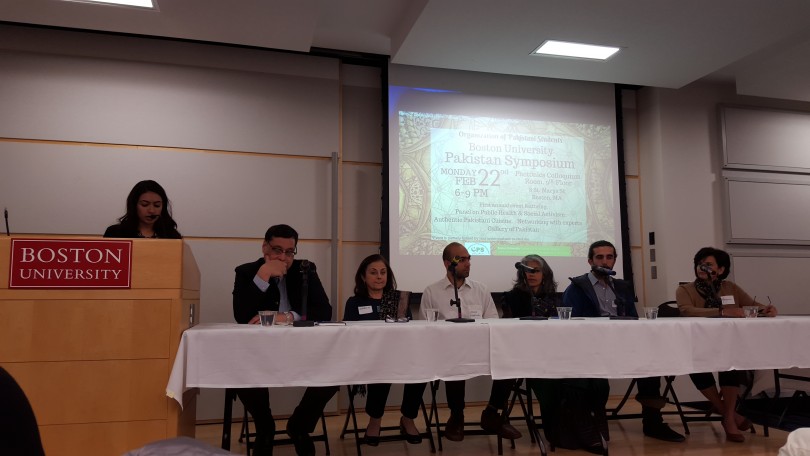Karishma Desai
BU News Service
Moin Khan is a new kind of social activist. Riding his motorcycle through the mountainous terrain and stopping at the historic monuments of Pakistan, Khan offers tours to foreigners and documents the other side of Pakistan that goes against initial preconceptions.
“When I invite people to Pakistan and pick them up from the Islamabad airport, they’re kind of skeptical about what’s going to happen…but I take them on my motorcycle for 15 days all across the Northern areas of Pakistan and when we come back to the airport, most of them have tears in their eyes and don’t want to go back,” he said.
“And these are all bikers from California,” Khan recounted regarding his latest expedition. Khan also said that the bikers who originally felt disdain towards Muslims and the Middle East after 9/11, were not ready to leave Pakistan.
Khan said his bike constantly broke down as he travelled from the China-Pakistan border to South Pakistan.
“I stopped at different bicycle shops 21 times and not a single person took money from me. Not only did they not change me for labor, but they also did not charge me for parts. They all insisted that I was a guest in their cities,” he said.
Khan’s latest journey that spanned from the Golden Gate Bridge to Lahore, Pakistan resulted in his documentary titled “A Different Agenda: Rediscovering Pakistan – The Untold Tale.”
Khan was just one perspective among a panel of social activists who are trying to increase awareness of issues in Pakistan and break negative stereotypes by utilizing their diverse talents.
“Social activism to me is educating people about what they don’t know,” Khan said.
In an effort to educate BU students on what they may not know about Pakistan, BU’s Organization of Pakistani Students (OPS) hosted the Pakistan Symposium on social activism and public health earlier this week. Dr. Adil Najam, the dean of Pardee School of Global Studies moderated the two-part panel discussion. This is the first event of its kind at BU and OPS plans to hold the event annually.
“We needed a large spring event which empowered the youth…We have lots of pre-med and pre-law students. So we came to the idea of a symposium,” Alina Razak, OPS president said.
During the fall, OPS hosts cultural events such as an Eid dinner and henna tattooing nights. OPS has also been involved with philanthropy by assisting with Pakathon, a hackathon that focuses on finding solutions for societal issues in Pakistan.
Public health is one issue that Pak-a-thon focuses on and was an issue further discussed at the second part of the panel.
“It’s the idea of using technology and innovation to address some of the most difficult challenges of our time and cultivate sustainable solutions,” Muhammad Zaman, professor of Biomedical Engineering and International Health at Boston University, said.
According to a 2009 WHO report, Pakistan spends only 0.4 percent of health expenditures on mental health, and of that amount, only 11 percent of the mental health budget is devoted to hospitals. Government spending on mental hospitals is lower than other low-to-middle income countries.
“In Pakistan, you go to a therapist or a psychologist only when you see hallucinations…We need to think beyond the mental health of an individual and think of the mental health of a society,” Madeeha Channah, a clinical coordinator at the Arbour HRI Hospital and founder of the Greater Boston Muslim Health Initiative, said.
Zaman said the fact that health issues exist in developed countries as well and highlighted the disparities in the U.S.
“Parts of the U.S. do not have a very healthy picture, where an African-American kid has a very difficult time filling out his or her prescription drugs….Go to the inner cities of Boston, in Roxbury, and see what the problems are,” Zaman said. “Media doesn’t highlight the negatives enough in health.”
Regarding cultural perception, Beena Sarwar said, “Bad news makes the headlines, but people don’t see enough of the good news.”
Beena Sarwar is a journalist and documentary filmmaker who was a 2006 Nieman Fellow at Harvard University. Sarwar started as an arts journalist and often covered theater, which often promoted activism, in contrast to Pakistan’s military-industrial complex.
“Do whatever job you’re doing really well and it will lead to social activism,” Sarwar said.
Sarwar spoke regarding the importance of journalists connecting with activism.
“A common goal for journalists is ‘giving a voice to the voiceless.’ In pursuit of objectivity, though, the media is further distancing themselves from people that are already considerably distanced,” she said.
Masooma Bhaiwala, one of the other social activism panelists is the president of an organization named OPEN (Organization of Pakistani Entrepreneurs). OPEN will be hosting an event titled “Social Entrepreneurship: Profit vs. Purpose” at Tufts University on Saturday, Feb. 27. Students can register online in advance to receive a half-price discount.




